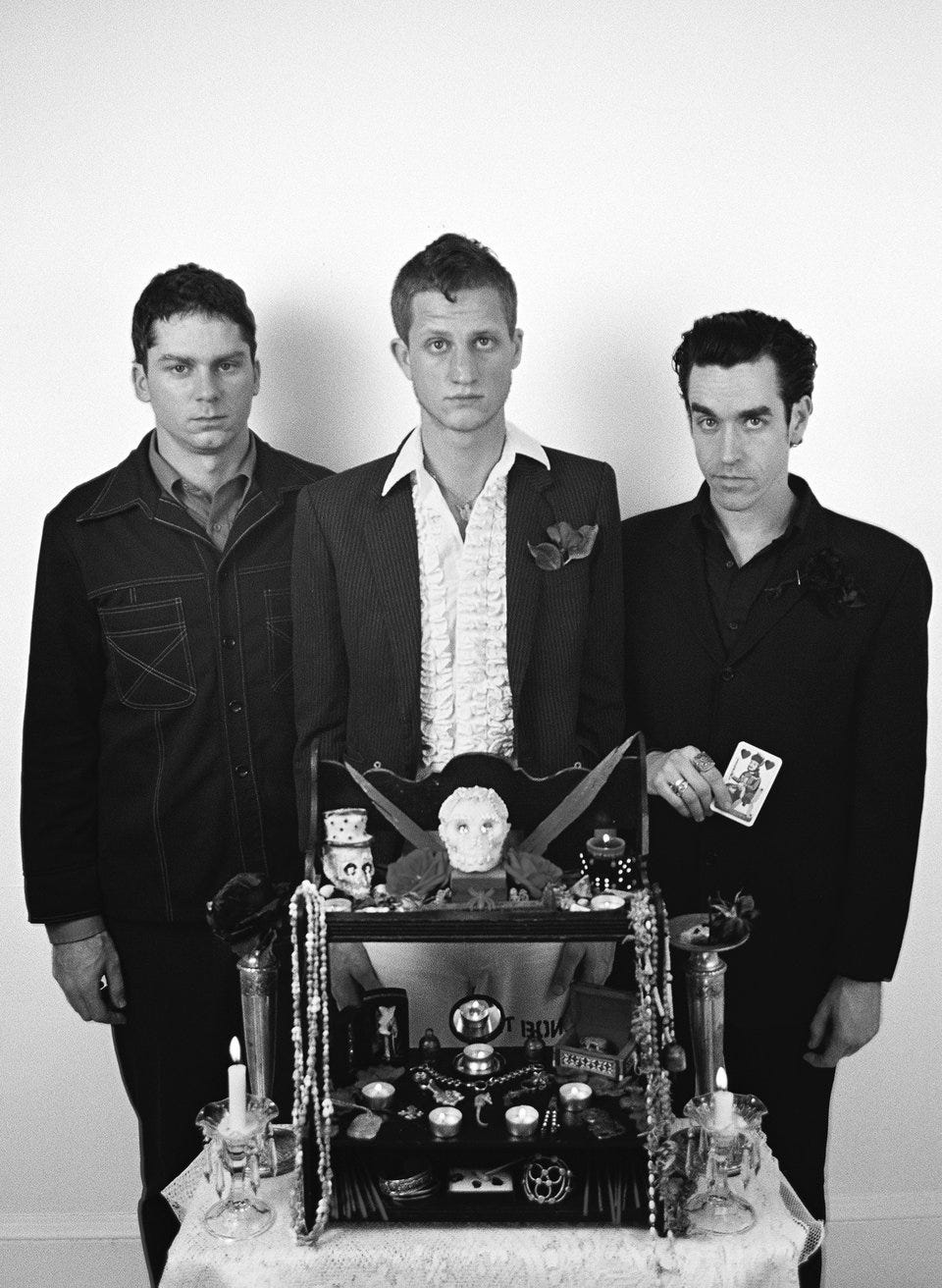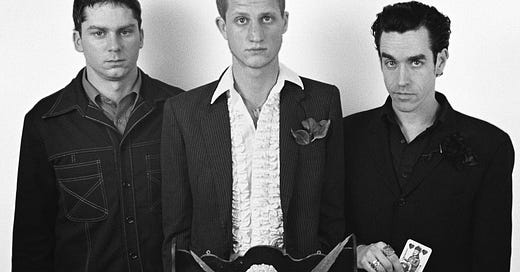Dave Clifford Talks Up Pleasure Forever's "Ominous" and Funky Return

Pleasure Forever circa 2003. Photo c/o the band.
BY GREGORY ADAMS
“It’s really strange and scary-sounding.”
This is Pleasure Forever drummer Dave Clifford on the general feel of Distal, a seven-song mini-album that marks the first new music from the project since 2003. Given the vampiric hypnotism built into its opening “Neolith Nonce,” or the jagged purple squeals guitarist Josh Hughes unpacks amidst a lean, leering backbeat on new single “To The Last Recorded Syllable of Time,” Dave may have a point.
While a menacing kind of perma-cool has been integral to Pleasure Forever's approach since the jump, it's also true that Distal takes on a different tack than the cabaret, goth, punk, and almost Doors-ian flourishes of the trio’s early ‘00s Sub Pop era. That’s partly because Distal didn’t start out as a Pleasure Forever project, but rather as a series of recording ideas Dave and vocalist-keyboardist Andrew Rothbard sent back and forth to each other as a way to reconnect. Eventually they reached out to Josh — an understated and absolutely underrated player who also spent time in ‘90s hardcore act Angel Hair, sludge-mongers Rabbits, and more recently SSOLD — to formally boot up Pleasure Forever’s next phase. Which, again, has “a real ominous, creepy vibe to it.”
“We didn’t aim for that,” Dave clarifies, “it’s just something that comes out when we play together. It’s like this strange interaction of our personalities.”
Despite some tonal differences, Distal — which sees release August 25 through Solid Brass Records — is another rock-solid effort from Dave and his longtime brothers-in-arms, who had initially linked up in Colorado's mid ‘90s hardcore scene as revolutionary synth-pushers The VSS. After splitting with vocalist Sonny Kay, the trio regrouped to deliver a darker miasma as Slaves, later changing their name to Pleasure Forever ahead of dropping an album of the same name in 2001. From the opulent sleaze of the trio’s early days up to the terror-fried grooving of Distal, they’ve never disappointed.
Speaking with Gut Feeling, Dave further explains the origins of Distal, telepathic music-making, and the elemental nature of a good funk beat.
This interview has been edited and condensed.
Pleasure Forever famously have an infinity sign baked right into your logo. How much of an inevitability was this reunion?
DAVE CLIFFORD: It never seemed like it was inevitable, but it was a thing that I had really hoped to have happen for a long time. In having played with a lot of different people since the time of playing with Josh and Andy, I really felt I was missing the way that [the three of us] worked and interacted with each other. None of us really has to say anything to each other about where to go with [a song]. There’s never any sense of needing to make suggestions, or guiding anything. We can be telepathic.
How did you end up guiding the other guys back towards making music as Pleasure Forever, then?
CLIFFORD: It started because we had heard about friends of ours passing, and then also parents passing. Over the years, I checked in with Andy and Josh separately, but we hadn’t really spent that much time together. I guess when some of these things happened, I would just think of what would it be like if one of those guys died — that [thought] would come to me.
In keeping with our anachronistic thing, and our lack of fitting in with the times, all of this came about after pandemic-times. When every one was home and making records remotely, none of this occurred to us. It was well beyond that point that we decided to do something like this.
I want to get into the drums on this recording, in particular. With songs like “Neolith Nonce" or “To The Last Recorded Syllable of Time,” it feels like you’re anchoring into a tighter groove than the smashing panache of early Pleasure Forever — songs that were busier around the kit. How intentionally were you sticking to the pocket this time around?
CLIFFORD: It was more that I was playing on my own, versus playing and writing in the room [with a band]. If somebody starts playing something, I’ll go, “Oh, yeah… I think it has a feel like this,” [but] then as we keep playing it over a couple of weeks then it might change a little. With this, though, “Neolith Nonce” started as a drum part. That style [of beat] is something I normally play [when] I’m on my own.
The older stuff was very deliberately trying to be musical in a different sense. There’s a lot of influence from Lou Reed’s Berlin, or older ‘20s and ‘30s music mixing in with ‘70s rock. It was much more expansive and twisted, whereas Distal — at least from what I’m playing — is kind of a one-part groove thing.
How much of that stems from your work with the Indie Drummer Collective, where you’re doing these drum covers of Stevie Wonder or Rick James? Like, how much funk and soul is in your style these days?
CLIFFORD: It’s a huge influence. It’s sort of funny… the thing I had in mind [for “Neolith Nonce”] was [based off] an Earth Wind and Fire song — or that type of beat, at least. I was going for that kind of a groove, but what Andy put overtop of it shifted the beat. It doesn’t sound the same, but it still works. He pushed it forward into more of a Led Zeppelin “Immigrant Song” type of thing, a real lean-in style. [Regardless,] a lot of the parts that I come up with are based on just taking stuff out of music that doesn’t seem like it would fit with what we’re doing.
You’ve developed a chemistry with Josh and Andy across nearly 30 years of off-and-on-playing. What can you say about their respective approaches to music, and how it gels with your own?
CLIFFORD: Their styles are incredible! Andy didn’t officially learn how to play piano. He’s not classically trained, but he’s definitely someone that can just pick up an instrument and play intuitively. And play it exactly how it should sound. He can come up with interesting and creative things on each instrument easily.
Josh is a genius — he went to college early; he has an extremely high IQ — and he has a different way of approaching things. His methods of creating guitar parts are pretty strange. Josh doesn’t play in a chordal sense; he plays with single notes. Some of the things he would do in the VSS I would call “the pterodactyl part” — these huge, dinosaur-sounding things that would come screaming into the song. But they sound so perfect! They add this whole other counter melody [to Andy’s playing]. Both of them are extremely unique, and talented.
Do you remember much about the transition from the VSS into Slaves, and what that meant on a musical troubleshooting level?
CLIFFORD: It was a very weird time. We tried not to get too bogged down with it, because all of us had restructured our lives completely by moving to San Francisco [from Denver] with the VSS, practicing five days a week, and working really hard with all of it. But it fell apart. We were like, “What are we going to do now?” But in my mind, I had this idea to do this strange combination of ritual music that was way more psychedelic and expansive. We could already see which way we wanted to go, [and] that we were limiting ourselves with the way the VSS was set up to be.
I guess something big, too, was Andy not playing bass anymore [ed. he'd played both synth and bass in The VSS]. It was just him playing keyboard at the beginning [of Slaves]. For the first record [a s/t 12-inch from 1998], it was just the Roland Juno-6. So, it was more organ-based, and it became more garage-y in a way.
Distal was all recorded remotely and apart, but will there be a time when the three of you play together in the flesh, whether that’s a show or just to catch up in a rehearsal room?
CLIFFORD: I can’t speak too much for the other guys, but at the moment there’s no plans for that kind of thing. Josh is still playing live; he’s got a band called SSOLD in Portland that is really cool. I think between that, work, and life, he’s got his plate full. Andy is doing his thing, too. He doesn’t like playing live, and hasn’t played live in a couple of decades. I think he would be the hardest one to convince.
Also, [Distal] wasn’t planned as a Pleasure Forever record. It wasn’t something where we were like, “Here’s our big comeback!” What I liked about [the project] from the beginning is that it’s us getting back together, and hanging out and talking — and our way of talking is by playing music together. Hopefully people aren’t going to think it’s a push for attention, or something like that.
END HITS
Antarctica “Absence”
Let’s stick with Solid Brass Records, a relatively new-ish Los Angeles record label also currently reappraising a swathe of underheard ‘90s hardcore and indie bands (see their recent archival releases for Grain and Nuzzle). Next up in that regard is the first-ever vinyl pressing of emo-adjacent dreamgazers Antarctica’s 1999 double album, 81:03.
Antarctica rose from the ashes of now-iconic mid-west emo quartet Christie Front Drive. Their guitarist-vocalist Eric Richter moved to New York City after the breakup and formed Antarctica. This next project took on a bit of the melodic drive of Christie Front Drive (oof…pun not intended. sorry) while ramping up the melancholy, the effects pedal swirliness, and the song lengths for Antarctica’s epic, three-song debut EP, 23:03 (I hope this gets reissued, too). 81:03 gets more profoundly synth-y, with the chipper, digital chirruping of opening number “Absence” taking on some serious “Bizarre Love Triangle” vibes.
I saw the band in Bellingham, WA when they were touring this record at the end of 1999, when they were out on the road with the Gloria Record (both bands sounded huge). Definitely worth revisiting, or falling in love with for the first time. The reissue arrives 09/15.


